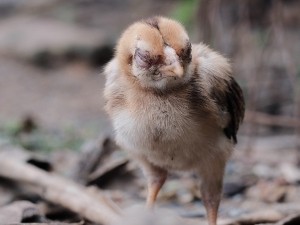
Baby chicks are known to hatch and spend their days exploring their surroundings, if your baby chick seems to be struggling in its early life, for example, if the bird’s eyes are stuck shut, then you’d be right to worry, this article explores why this happens.
Table of Contents
Baby chick eyes stuck shut:
Chicks can’t talk to us but we can tell when something is wrong with these birds by looking at their appearance and their behavior, here is why your baby chicks’ eyes may be stuck shut
Ammonia poisoning:
If there is chick/en poo around, then there is ammonia around. Ammonia is produced when chicken poop is decomposed.
If your chicken’s coop is not properly ventilated then this can cause ammonia to build up in the coop.
If your bird is exposed to ammonia fumes, for long periods of time, then the bird can develop problems with its eyes and respiratory system.
Eye issues, relating to ammonia poisoning, include a swollen eye, red-eye, and an eye that can’t open. Other eye-related signs that your bird has ammonia poisoning include blindness, crusty eyes, light sensitivity, and a grey, cloudy-looking cornea
What to do:
The first thing that you’d need to do is clean up your chicken coop, this will lower the levels of ammonia fumes in the air.
Make sure that you ventilate your chicken’s coop, good ventilation is one way to maintain in-barn air quality control. Also, keep the bird’s litter dry to minimize ammonia production.
Dispose of, and replace, the bird’s litter on a regular basis. Peat is a great litter to use when trying to minimize ammonia production in your bird’s spaces.
If your bird’s eyes are closed shut, and are red, and swollen, then other birds may try to peck at the eyes. Keep this from happening by isolating the affected bird, give the bird its own water and food while it’s being isolated.
Stress:
If you’ve just received your baby chick, then the bird may be suffering from shipping stress.
The shipping process isn’t always smooth sailing for chicks, these birds can become stressed by a variety of things, including being shipped around. In addition, the bird may have not eaten or drunk soon enough after being shipped.
A bird suffering from shipping stress may keep its eyes shut and it may also peep loudly and constantly, this is a sign that your bird is struggling and asking for help
What to do:
Start off by isolating the bird and getting it into a calm environment, this should help it relax.
Get the bird’s energy levels up by creating a sweet drink made up of warm water, about 1tsp of sugar, honey, or molasses per ¼ cup of water, and a pinch of salt. This drink should boost the bird’s energy levels and get it to open its eyes
Put the bird back with the rest of the flock once it has regained its energy.
Injury:
If your baby chick is smaller than the rest, or if it lives among adult chickens, then the bird’s eye could have become injured by the other birds.
A baby bird’s eye can become injured through pecking. The bird may have also scratched itself, if this happened, then opening the lid may be uncomfortable or painful to the bird. Bacteria and dirt can enter the wound and cause it to get worse.
What to do:
If you realize that one of your baby chicks has been pecked in the eye, and is injured, then the first thing that you’d need to do is isolate the injured chick.
Isolating the bird will keep it from getting pecked again and will give the bird the opportunity to heal on its own in a calm and relaxed environment.
Give the baby adequate amounts of food and water and make sure that the bird eats. Keeping the bird under a heat lamp may also be helpful.
If there is any debris or dirt in the baby’s eye you can wipe this off with a warm damp washcloth, this may help the chick open its eye, you can also clean the eye using a saline solution.
If the eye starts to look cloudy then you can try using Vetericyn eye gel on the injured eye, this is said to work better than bandaging the bird’s eye.
If the bird is bleeding from the eye you can stop the bleeding by applying slight pressure to the eye, use a gauze pad to do this.
Once you get the bleeding to stop, use an antibacterial wound spray on the bird’s eye, and if needed, you can bandage your bird’s eye.
If the baby bird was pecked by an adult bird then you’d need to keep this bird, and your other baby chicks, away from the adult birds as well. Baby birds should only be introduced to adult birds when they reach a month old.
If you enjoyed this article then you may also be interested in other chicken related articles. Here are some articles that you may be interested in: Pink Chicken Poop, Mustard Yellow Chicken Poop, Chicken Poop Clear Jelly, Baby Chick Not Opening Eyes, Signs A Baby Chick Is Dying

